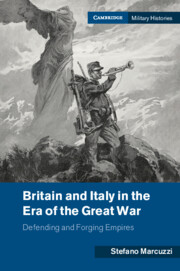Book contents
- Britain and Italy in the Era of the Great War
- Cambridge Military Histories
- Britain and Italy in the Era of the Great War
- Copyright page
- Dedication
- Contents
- Figures
- Maps
- Acknowledgement
- Introduction
- Part I Making the Anglo-Italian Entente (1911–1915)
- Part II Integrating Italy into the Triple Entente (Spring 1915–Summer 1917)
- Part III The Forked Road to Victory and Peace (Autumn 1917–Summer 1919)
- 12 Context
- 13 Clash of Responsibilities
- 14 Response to Military Emergencies
- 15 Re-shaping Allied Grand Strategy
- 16 Propaganda As a Strategy
- 17 Divided at the Finish Line
- 18 Versailles 1919
- Epilogue: Bloody Christmas in Fiume
- Conclusions
- Bibliography and Sources
- Index
12 - Context
from Part III - The Forked Road to Victory and Peace (Autumn 1917–Summer 1919)
Published online by Cambridge University Press: 08 December 2020
- Britain and Italy in the Era of the Great War
- Cambridge Military Histories
- Britain and Italy in the Era of the Great War
- Copyright page
- Dedication
- Contents
- Figures
- Maps
- Acknowledgement
- Introduction
- Part I Making the Anglo-Italian Entente (1911–1915)
- Part II Integrating Italy into the Triple Entente (Spring 1915–Summer 1917)
- Part III The Forked Road to Victory and Peace (Autumn 1917–Summer 1919)
- 12 Context
- 13 Clash of Responsibilities
- 14 Response to Military Emergencies
- 15 Re-shaping Allied Grand Strategy
- 16 Propaganda As a Strategy
- 17 Divided at the Finish Line
- 18 Versailles 1919
- Epilogue: Bloody Christmas in Fiume
- Conclusions
- Bibliography and Sources
- Index
Summary
The Twelfth battle of the Isonzo, between 24 October and 12 November 1917, was a traumatic moment in Italian history and threatened the very unity of the country. It originated with the results of the earlier battle. Although they had failed to achieve a decisive breakthrough, the Italians had advanced some 10 kilometres, which by Isonzo standards was a remarkable result. The Austro-Hungarians communicated to their German allies that they could not withstand another Italian attack and Hindenburg, despite the opposition of his subordinates, including Erich Ludendorff, reluctantly decided to mount a German and Austro-Hungarian counter-offensive
- Type
- Chapter
- Information
- Britain and Italy in the Era of the Great WarDefending and Forging Empires, pp. 207 - 208Publisher: Cambridge University PressPrint publication year: 2020

